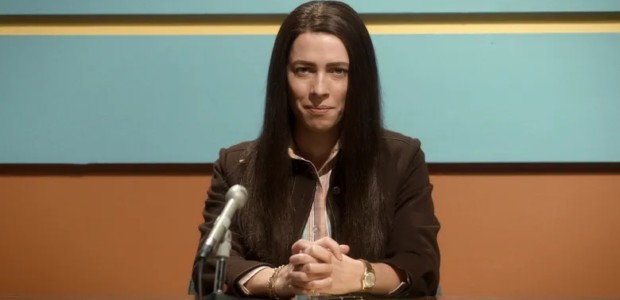What’s one of the scariest movies you’ve seen?
That was the question raised by my friend Cory Brown recently during a phone chat. Cory’s probably the biggest horror fan I know—a guy with a nearly encyclopedic knowledge that dwarfs my own by comparison. I don’t think we’ve ever had a conversation where I didn’t learn about some new movie or comic book or miniseries I’ve never heard of. Quite frankly it amazes me sometimes when he’ll ask me for a suggestion on something good, because I’ve more or less come to the conclusion that he’s seen every horror movie ever made. Still, the question will come up: Seen anything good lately? Have you heard of this? What’s the scariest movie you’ve seen this year?
Amazingly, the answer to that question wasn’t even a horror movie. It was CHRISTINE—and not the one about the car.
I don’t remember how I first heard about Christine Chubbuck. Over the course of my nearly thirty-seven years on this planet I’ve somehow accumulated a vast wealth of bizarre knowledge from the mundane to the terrifying, and, usually, I can not only recite a litany of facts, trivia, and information, I can also tell you why I know it, SLUMDOG MILLIONAIRE-style. The exception to that is Chris Chubbuck. I don’t know how, when, or why her name and story came to take deep root in my psyche; it seems I’ve simply always known that Chris Chubbuck committed suicide on live television. It’s a story I’ve always found tragic and fascinating by equal measures: On the morning of on July 15th, 1974, Chubbuck—a reporter turned talk-show-host— told her coworkers at WXLT-40 in Sarasota that she wanted to open today’s episode of Suncoast Digest with a news segment. They acquiesced, and while her guests waited off-camera, Chubbuck sat down behind a news desk, covered three stories, then produced a .38 revolver and blew her brains out in front of horrified viewers across Florida.
In the days—and even months—following her death, those around Chris Chubbuck would struggle to understand what led to the events of that morning. Though she was a well-known and loved local TV personality, Chubbuck was losing her lifelong battle with depression (and, from personal accounts, what sounds like borderline personality disorder), a battle exacerbated by unique life circumstances. She’d recently been informed by her obstetrician that an ovarian surgery the year before had probably rendered her sterile; the man she was interested in turned out to already be dating her best friend; and—a month shy of turning thirty—she was still a virgin, a fact that sent her into crippling downward spirals when she meditated on it. Whether any one of those things, or a combination of them, or something completely unknown contributed to her ultimate decision is anyone’s guess. In lieu of a suicide note, she left behind copy for her co-workers to read on the noon news: “Christine Chubbuck shot herself in a live broadcast this morning on a Channel 40 talk program. She was rushed to Sarasota Memorial Hospital…” The questions of why and when Chubbuck made that fatal decision are the subject of the biopic CHRISTINE, which hit the festival circuit in 2016 but didn’t reach home media until 2017. In the process of going a long way towards answering those questions, it becomes one of the most unintentionally terrifying movies in recent years.

The fear in CHRISTINE isn’t the sort you get from slashers or riding roller coasters; it’s a deep-down, pit of the stomach lurking dread, a fear that leaves you feeling dirty afterwards. It’s a sense of emotional and spiritual wrongness; that a part of you has touched something tainted, and that while you may not be forever altered by that, it’s going to take you a good few days to wash those emotional stains away. That’s because, in the hands of director Antonio Campos and writer Craig Shilowich, Christine Chubbuck—as brought to life by Rebecca Hall—becomes a completely living, breathing person. The viewer just doesn’t spend time with her, they get to know her in a deeply intimate way that every character study director should envy. Campos takes us through her daily life—her frustrating relationship with her mom, her struggles at work, her attempts at friendship with her coworkers—and the result is something so mundane yet so relatable and fascinating that it becomes real. Hall, meanwhile, infuses Christine with a subtle but powerful charisma. She’s immensely likeable. She’s assertive, brassy and outspoken, brave, inquisitive, just a little bit naughty, passionate about her job, and above all lovable (indeed, one of the many theses that the film explores is that the people around her did love Christine Chubbuck; she just couldn’t love herself). More than a few viewers will find themselves wanting to be her buddy, or—like me— the romantic savior she keeps pining for. We watch her argue with her boss about the future of broadcast journalism and we root for her; we see her get a minor victory and we celebrate her win. When we see her alone at home after work we want to hang; when we see a date go awry, we want to ask her out.
Then, very slowly, something starts to happen. Just as the film has, to a certain point, replicated the experience of what it’d be like to have worked with Chris Chubbuck, so too does it recreate the experience of standing by while she begins to slowly deteriorate and not even realizing it’s happening. Even though most audiences will have come into the movie primed with the knowledge she dies at the end, the film’s first half has you so enthralled by Christine as a person that it’s easy to forget this is a true story with a clock ticking down to tragedy; and, just as so many of us are unable to see depression in those around us until it’s too late, the film beautifully builds up Christine’s downward spiral in such a way that not even the informed viewer understands what’s happening until it’s too late. The Chris Chubbuck from the early part of the movie starts to change. Her assertiveness becomes aggression; her outspokenness becomes hostile outbursts; her inquisitiveness becomes creepy obsession and her naughtiness a little sexually uncomfortable. And this all happens subtly—by seconds, by scenes, by small actions here and there. Before the audience realizes it, the tone of the film has become pitch black; we have been sucked wholesale inside of Christine Chubbuck’s mind, forced to see the world the way she sees it, for all of its bleak emptiness and futility—as a place of absolute, terrifying, pitch-black meaninglessness.
And then she kills herself.

Campos makes the effective choice of not ending the movie with Chris’ death. Rather, we get to see those who knew her react, with all of the same confusion and grief the audience is feeling; and it’s then we realize that we’ve just been put through one of the most effective and soul-shattering simulations ever made. The audience has gotten to know and love a real human being and then see them die under very bizarre circumstances.
Watching CHRISTINE is, for lack of a better word, haunting. “You just gave me the chills,” Cory told me after I gave him a more detailed rundown of the film during our chat. The ghost of Rebecca Hall’s Christine Chubbuck will stay with you for a long time. She’s more existentially terrifying than any creation of Lovecraft’s, more soul-disturbing than any cannibal or slasher. She’s a real, loveable person who committed a single act of unspeakable violence; and somehow, that’s more frightening than anything I’ve seen in a very long time.



No Comments